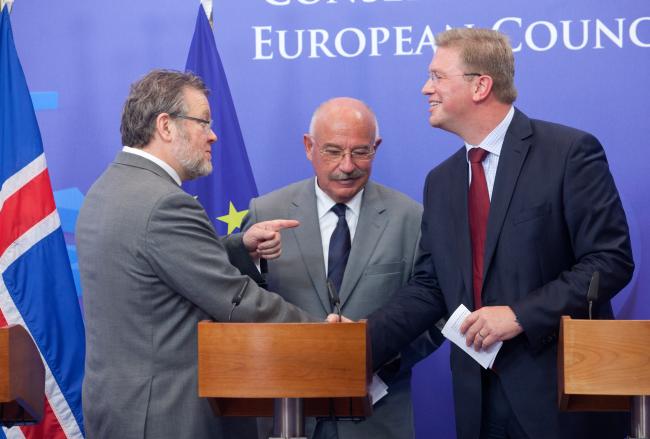Four chapters opened and two closed at the launch of substantive accession negotiations between Iceland and the EU
The first substantive EU–Iceland Intergovernmental Conference (IGC) in Brussels on 27 June saw the opening of four chapters and the immediate closing of two of them. At the meeting, Icelandic Foreign Minister Össur Skarphédinsson stated Iceland's willingness to open the chapters on fisheries and agriculture as soon as possible. He also stated that the Icelandic negotiating teams would be ready to open half of the remaining chapters during the upcoming Polish presidency (1 July – 31 December) and the remainder under the Danish presidency (1 January – 30 June 2012).
The Intergovernmental Conference today marked the start of substantive membership negotiations between Iceland and the EU. It was chaired by Hungarian Foreign Minister Janos Martonyi on behalf of the Council of the European Union, while Enlargement Commissioner Stefan Füle also addressed the conference.
Foreign Minister Skarphédinsson welcomed the completion of this important staging post, and declared the determined support of his government for the negotiations as well as the clear majority support of the Icelandic people for having the opportunity to vote on an accession treaty once the negotiations have been completed. The Minister underlined how well the process had gone so far and the necessity of maintaining the momentum which had been achieved in the negotiations.
Iceland's negotiating positions were presented for the four chapters to be opened, all of which are covered by the EEA Agreement and deal with:
• Public procurement (Chapter 5),
• Information Society and Media (Chapter 10)
• Science and Research (Chapter 25), and
• Education and Culture (Chapter 26).
It was decided to close negotiations on the latter two chapters as they have been implemented in their entirety into Icelandic law. As to the chapters on Public procurement and Information Society and Media, the negotiation position of the EU stated that Iceland should complete the implementation of certain legislation in accordance with the EEA agreement, by the date of accession.
The Foreign Minister recalled that just two years had passed since the Icelandic Parliament agreed to apply for EU membership. He welcomed the success of the negotiations on the first four chapters and in particular, the closure of two chapters, namely, Science and Research and Education and Culture. In these two important areas Icelanders have already benefited from close cooperation with EU member states and Icelandic students, teachers, scientists and artists have participated actively for many years in EU programs related to science, research, education, culture and youth activities.
The Minister said that Iceland was well prepared for the negotiations. The screening work over the last eight months, comparing Icelandic and EU legislation, confirmed that Iceland has fulfilled much of the EU acquis through its membership of the EEA agreement and Schengen. At the same time, understanding has increased between negotiating parties in areas where legislation differs, for example, in fisheries, agriculture and the environment.
Future negotiations will focus on specific chapters of the acquis, which number in all 35. . Iceland's negotiating committee and teams, comprising representatives from the government, principal stakeholders and organizations will shape Iceland's negotiating positions in accordance with the goals outlined by the Icelandic Parliament. The next EU-Iceland intergovernmental conference is scheduled to take place in October.
Speech by Foreign Minister H.E. Mr. Össur Skarphédinsson is available here:

